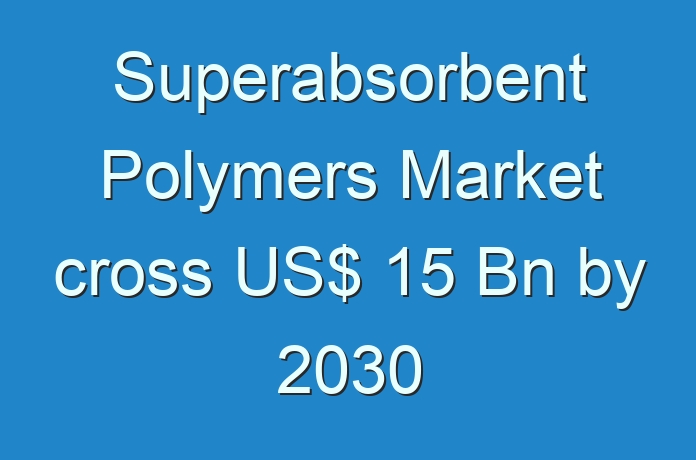
Superabsorbent Polymers Market: Introduction
In terms of value, the global superabsorbent polymers market is anticipated to expand at a CAGR of 5% from 2020 to 2030 and cross US$ 15 Bn by 2030. Asia Pacific dominated the global superabsorbent polymers market in terms of volume in 2019. It is estimated to be the leading region of the global superabsorbent polymers market during the forecast period. The personal care & hygiene sector is projected to offer lucrative opportunities for the superabsorbent polymers market in the near future.
Superabsorbent Polymers Market: Major Drivers and Restraints
Rise in incidence rate of diseases such as diabetic ulcer, pressure ulcer, and venous stasis ulcer among the geriatric population has boosted the demand for advanced injury care products such as superabsorbent polymer products. They are considered ideal for use in wound dressing applications, due to their high water content that helps maintain moist wound environment and cool and non-adherent surface. They also prevent heat absorption and provide comfort to patients. Thus, proven benefits of superabsorbent polymer products such as improved water retention ability, controlled release, and preservation of stored components are anticipated to drive the global superabsorbent polymers market during the forecast period.
Request PDF Brochure –
https://www.transparencymarketresearch.com/sample/sample.php?flag=B&rep_id=2898
The increase in usage of superabsorbent polymers in disposable baby diapers and sanitary products is propelling the global superabsorbent polymers market. These polymers are added in the form of absorbent layers at the core of the diapers. This helps them absorb the liquid that is then converted into gel. This protects the baby from rashes. Furthermore, rise in birth rates has contributed to the growth in demand for baby diapers. This, in turn, is expected to significantly boost the superabsorbent polymers market across the globe.
REQUEST FOR COVID19 IMPACT ANALYSIS –
https://www.transparencymarketresearch.com/sample/sample.php?flag=covid19&rep_id=2898
Several players have taken strategic initiatives, such as capacity expansion, in order to expand their superabsorbent polymers business, owing to high demand for superabsorbent polymers in various industrial applications. This is also projected to boost the superabsorbent polymers market during the forecast period. For instance, in October 2018, Nippon Shokubai Co., Ltd. expanded its superabsorbent polymers production capacity at its manufacturing facility at Zwijndrecht, the Netherlands.
Read our Case study at :
https://www.transparencymarketresearch.com/casestudies/chemicals-and-materials-case-study
The new plant has production capacity of 100,000 tons per year. This move is expected to help the company meet the rising demand for superabsorbent polymers. The volatility in prices of raw materials is a key restraint of the global superabsorbent polymers market. Acrylic acid, which is manufactured from propylene, is a key raw material used in the production of superabsorbent polymers. Fluctuation in prices of raw materials is a major concern for manufacturers of superabsorbent polymers, as the price of acrylic acid is susceptible to fluctuations in crude oil prices.
Superabsorbent Polymers Market: Prominent Segments
In terms of value, the sodium polyacrylate segment held major share of the global superabsorbent polymers market in 2019. This trend is anticipated to continue during the forecast period, due to considerable usage of acrylate in construction and medical industries. Based on application, the hygienic segment constituted a significant share of the global superabsorbent polymers market in 2019. This trend is estimated to continue throughout the forecast period. On the other hand, the non-hygienic segment is expected to expand at a faster pace during the forecast period.
Competition Landscape
Major global manufacturers of superabsorbent polymers include Evonik Industries AG, BASF SE, Nippon Shokubai Co., Ltd, LG Chem Ltd., Sumitomo Seika Chemicals Co. Ltd, Sanyo Chemical Industries, and KAO Corporation. The volatility in raw material prices of the superabsorbent polymers acts as a significant barrier for new players to enter the market.





